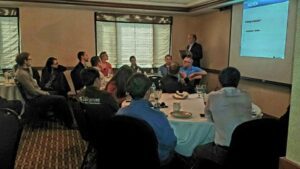
Farming. It’s the center of our world in America’s heartland. Even in mid-sized cities around Iowa, Illinois, and other ag-based states, people at least have an idea of the importance of the farmer, and many even have an appreciation of what it takes to get food to the masses. Carthage is a small town in west-central Illinois, in prime corn and soybean farm country. It also is home to one of the nation’s premiere swine farm management companies. Cattle farmers dot the landscape, too. Oh, and it’s home to DISTek Integration, Inc. and the corporate office is still there. We know farmers, and we know farming.
So, when our youth grow up, even the “city kids” learn from “farm kids” what it takes to operate a modern farm, to deliver based on hard work, despite what Mother Nature throws at you. It’s a way of life, and farmers live it every day. And “city folk” understand and appreciate that. But what happens when you get too far “off the farm?” When you go to Chicago, or Washington, D.C., or when you go overseas? Do people understand? Well, a local “farm boy” quickly found out that the world has no clue, sometimes.
T.J. Menn grew up in rural Illinois near Carthage. While his parents didn’t themselves farm, he was surrounded by farmers, and many of his close relatives farmed. He worked for farmers many summers, and understood the nuances of farming. And he understood the economics. So after T.J. entered West Point (yes, THE West Point Military Academy), and after he finished his initial tours of duty (another story), he was accepted to Harvard’s John F. Kennedy School of Government, where he was surprised to see how farming was treated. The decades-old farm program is a complicated piece of legislation, but here it was boiled down to “it’s a hand-out to farmers” in his economics class. And he quickly learned that nobody else in that class, that class of future policy-makers throughout the world, knew any better. And so, T.J., a hard-worker, do-it-or-nobody-else-will, kind of guy with farm roots, knew he had to do something
And do something he did! I won’t go into all the months of planning that was required. But T.J. got 23 of his fellow students to sign up for a week-long trip to America’s Heartland during their spring break, to see first-hand how farmers work to feed the world. They chose this instead of going home to visit their families and friends or joining the millions of other students having fun on spring break in warmer climates. These graduate-level students are currently, or will be, policy-makers in many forms of government in many countries. But they all share an interest in learning, and this would be the trip of a lifetime for them. And so, in March of 2015, T.J. and his group landed in Hancock County, IL. The purpose of the trip was to expose these anxious students to as much of the “farm life” as possible. And so he did.
Monday: Visit an Amish farm and lumber mill, then enjoy dinner in an old 19th century barn. Tuesday was busy: Visit a local dairy farm, then visit the headquarters of Dadant’s, one of the oldest and best-known beekeeping suppliers in the world and see their honey operation. That afternoon, they visited a large-scale grain farm and discussed the Farm Bill and farm equipment. The day ended with a cozy bonfire style cookout for dinner. Wednesday brought hog farm and cattle auction visits and a trip to a local winery for some lively Q&A with local politicians. Thursday it was “goodbye Carthage” and travel to a GMO lab and Kinze’s manufacturing plant in central Iowa. Friday, it was a trip to the Quad-Cities of Iowa/Illinois and a tour of John Deere’s Harvester Works to see how large agriculture combines really are! Then lunch, where a few of us folks from DISTek were able to review the current state-of-the-art technologies used in ag. Finally, they had the afternoon to “play” on the many pieces of equipment on display at the John Deere Pavilion in Moline, IL. Up close to farm equipment, things took on a completely new perspective for many of them! And Saturday, it was time to start their trips back to school.
What an experience they had, and what an experience it was for us to engage in the very thoughtful discussions they had at lunch on Friday. We now know that some of tomorrow’s policy-makers are at least better informed about America’s farm life, and we wish them well as they continue their education and their work.
It’s hard to believe it’s been a year since FarmTrek ended. If you are interested in reading more about their trip, it’s easy to find. Search “Farm Trek 2015” online, and you’ll find a number of articles about their trip, the students, and the activities. Thanks, T.J. Menn and the rest of the Farm Trek 2015 for your service!

